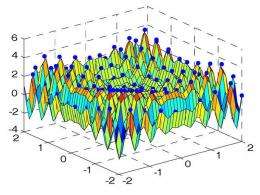December 3, 2009 feature
Researchers Build Artificial Immune System to Solve Computational Problems

(PhysOrg.com) -- By mimicking the way that a living body acquires immunity to disease through vaccination, researchers have designed an artificial immune system to solve optimization problems more effectively than before. The results show that the biologically motivated approach is better at exploring a greater amount of space and quickly locating the desired local and global optima than previous methods.
The researchers, Kumlachew M. Woldemariam and Gary G. Yen, both from Oklahoma State University, have published their study in a recent issue of IEEE Transactions on Systems, Man, and Cybernetics - Part B: Cybernetics.
As the researchers explain, the field of artificial immune systems (AIS) is an emerging branch of evolutionary computation in which computational systems are based on the structure and behavior of the immune system. By providing methods in pattern recognition, data analysis, and machine learning, AIS has applications in fields including computer science, robotics, and information technology.
Unlike previous artificial immune systems, the system in the new study specifically takes advantage of the way that vaccines can improve the performance of the immune system. The antibody cells in the immune system are constantly trying to recognize foreign or malfunctioning cells (antigens such as bacteria, viruses, and tumors) in the midst of the body’s own healthy cells (mainly other antibodies). The way that the immune system distinguishes between different kinds of cells can be formulated as an optimization problem, in which the antibodies are the points in the decision space and the antigens are the solutions that the immune system looks for.
Although the immune system usually works very well, sometimes it doesn’t identify an antigen quickly enough to prohibit it from causing illness. To accelerate the immune system’s functioning, vaccines can be administered to enable the immune system to detect a new (weakened) antigen and develop an immunological memory so that it can quickly recognize the same antigen in the future.
Drawing inspiration from how such vaccines work, the researchers’ artificial immune system can be enhanced to quickly identify optimum solutions by being injected with certain points in decision space that act as weak antigens, or vaccines. In their study, Woldemariam and Yen explain how to determine which points should be used as vaccines to be “injected” into the algorithm. Once in the algorithm, the vaccines activate the antibody population to incorporate more diverse antibodies and explore new landscapes in decision space, so that the antibodies continually come closer to locating a desired local optimum point.
“The main idea of introducing the notion of vaccines in the evolutionary algorithm is to help enhance the diversity of antibodies,” Yen told PhysOrg.com. “The way the vaccines are extracted from the decision space is in such a way that the decision space is explored widely. The implementation of the algorithm in multimodal optimization problem shows how fast and efficiently the antibodies, triggered by the vaccines, learn and locate the local and global optimal solutions of the problem. Therefore the vaccines help antibodies to achieve a speedy learning and diversified exploration.”
When comparing the new algorithm, called Vaccine-AIS, to other artificial immune systems, the researchers found that Vaccine-AIS outperformed the others by locating the global and local optima in a plot in fewer evaluations. The key to the improved performance is that the algorithm can cover a larger portion of the search space, due to help from the vaccines. As Yen added, AIS has the potential for improving computational abilities in many other areas.
“AIS was originally designed for data mining, anomaly detection and the like,” Yen said. “Its use as an optimization tool is a very young research area but its performance is drawing interest from researchers. Recently there has been research on using artificial immune systems in fault estimation and to design a power system stabilizer. The application of AIS in medical image processing for MRI (magnetic resonance imaging) is being studied as well.”
More information: Kumlachew M. Woldemariam and Gary G. Yen. “Vaccine-Enhanced Artificial Immune System for Multimodal Function Optimization.” IEEE Transactions on Systems, Man, and Cybernetics - Part B: Cybernetics, Vol. 40, No. 1, February 2010.
Copyright 2009 PhysOrg.com.
All rights reserved. This material may not be published, broadcast, rewritten or redistributed in whole or part without the express written permission of PhysOrg.com.
















